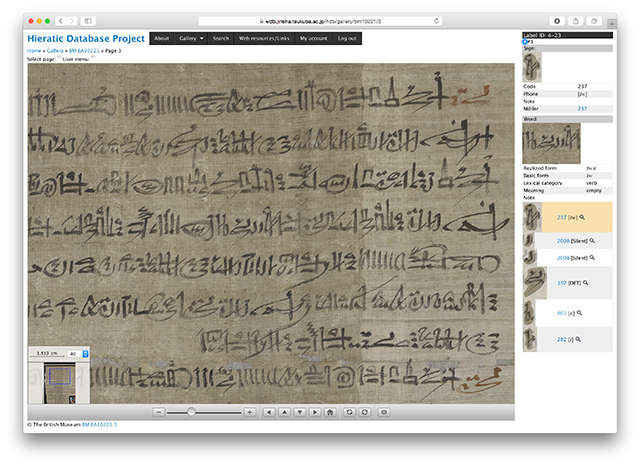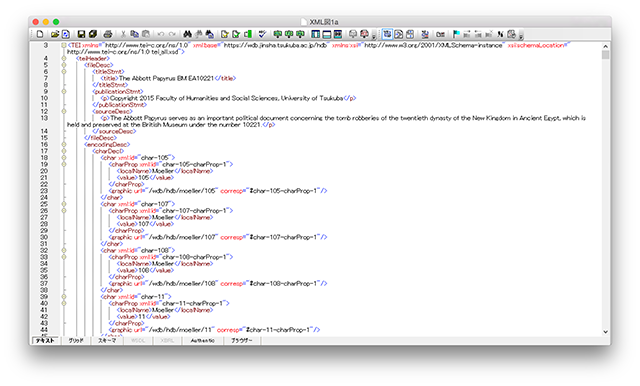キーワード:人文情報学、デジタルアーカイブ、メタデータ、知の構造化
http://www.jinsha.tsukuba.ac.jp/research_group/tsdh
 人文学研究は、従来文献資料などを主な研究対象とし、その成果を発表する方法もほとんどの場合、書籍の出版など紙媒体による一方向のアウトプットに限られていました。しかし、近年の情報技術の発展により、デジタルアーカイブ化された資料がネットワークを通じて共有されるようになり、それが人文学研究の手法に大きな変化をもたらしました。デジタル・ヒューマニティーズ(人文情報学)は、デジタル時代における人文学の価値の再創造を模索すべく、活発な活動を展開しています。
人文学研究は、従来文献資料などを主な研究対象とし、その成果を発表する方法もほとんどの場合、書籍の出版など紙媒体による一方向のアウトプットに限られていました。しかし、近年の情報技術の発展により、デジタルアーカイブ化された資料がネットワークを通じて共有されるようになり、それが人文学研究の手法に大きな変化をもたらしました。デジタル・ヒューマニティーズ(人文情報学)は、デジタル時代における人文学の価値の再創造を模索すべく、活発な活動を展開しています。
デジタル技術は人文学に何をもたらしたか
デジタル技術やネットワークによって、博物館の奥深くに収納され普段目にすることができないような資料も、高解像度画像としてインターネットを通じ世界中どこからでもアクセス可能になりました。また、学術情報のオープンアクセスやインターネット上の研究者のブログなど、アウトプットの形も多様になり、同じ研究領域の中だけで流通していた情報は、別の研究領域の研究者だけでなく、一般の人たちにとっても身近なものになったといえます。
例えば1枚のパピルス画像を通じて、従来議論をする機会のなかった考古学者と宗教学者、文学者、さらに資料の内容によっては建築や天文学といった分野の研究者が出会い、多角的な意見交換の後に、新しい発見をもたらすこともあります。すると、情報に効率的にたどり着くための方法の開発など資料共有のための技術的な問題だけでなく、これまで分野ごとに多様であった研究手法や研究評価基準の統一化や、人文学による社会貢献とは何かというような多種多様な問題を解決するための研究もまた必要になってきました。

図1:代表者が構築した古代エジプト語神官文字画像データベースシステム。文字の機能や発音、語の品詞や語義など、言語学的な情報が資料画像上から直接検索できる。

図2:上記システムから出力したTEI 形式XML ファイル
デジタル時代に人文学がもたらす未来について考える
本リサーチユニットは、宗教学や言語学等の人文学研究者と図書館情報学の研究者で構成されており、各メンバーはそれぞれの専門分野の研究と「デジタル・ヒューマニティーズ」研究の2足のわらじをはいています。人文学が個々の資料に深く関わるのに対し、図書館情報学は個々の資料よりも資料群全体の性質や状態に着目するというように、両者は同じ文献資料を扱うものではあっても全く対照的な学問です。しかしながら図書館情報学もまた、従来の紙媒体の資料からデジタル化を経て、情報の新しいあり方を模索しているという点では、人文学と同じ問題に直面しているともいえます。だからこそ、デジタル・ヒューマニティーズが裾野を大きく広げているいま、このメンバーによって独自のアプローチができると考えています。
社会への貢献・実績
- 情報処理学会「第99 回人文科学とコンピュータ研究会」における筑波大学デジタル・ヒューマニティーズ研究セッションおよびパネルディスカッション開催 ( 2013年8月3日・筑波大学)
- ワークショップ「デジタル・ヒューマニティーズと人文科学の再接続」開催 ( 2013年11月9日・筑波大学)
- 日本デジタル・ヒューマニティーズ学会国際カンファレンス JADH2014 開催 ( 2014年9月19~21日・筑波大学)
- スーパーグローバル大学創成支援採択事業キックオフ・ワークショップ “Digital Humanities Worldwide” 開催(2015 年2 月15 日・筑波大学)
- WDB: General-purpose Platform for Database System of Annotated Images (https://wdb.jinsha.tsukuba.ac.jp)
取材:平成27年7月1日
Services provided by humanity studies for society in the digital era
Unit members : Miyake, Yutaka Tokii, Maki Ono, Motoi Matsumura, Atsushi Ishida, Takeru Ikeda, Jun Ikeuchi, Atsushi Watanuki, Toyoaki Yazawa, Makoto Suzuki, Nobutaka
Unit name:Digital Humanities
Keywords: digital humanities, digital archive, meta-data, structured knowledge
 In the past, research subjects of humanity studies were primarily documents, and presentations of research results were only limited to the one-directional output: paper media including the publication of books. In recent years, however, digitally archived documents have been shared through the Internet due to the advancement of information technology, which has brought significant changes to methods for conducting humanity studies. Our research unit: Digital Humanities, implements various activities to recreate the values of humanity studies in the digital era.
In the past, research subjects of humanity studies were primarily documents, and presentations of research results were only limited to the one-directional output: paper media including the publication of books. In recent years, however, digitally archived documents have been shared through the Internet due to the advancement of information technology, which has brought significant changes to methods for conducting humanity studies. Our research unit: Digital Humanities, implements various activities to recreate the values of humanity studies in the digital era.
What was brought to humanity studies by digital technology?

Figure 1: An image database system of hieratics used in Ancient Egyptian established by the unit representative. The system allows its users to search images for linguistic information.
Documents and materials that are stored and strictly managed in museums and would not have been available to the public can be now accessed from anywhere in the world through the Internet in the form of high-resolution images due to the advancement of digital technology and networks. Although research information used to be shared within each research field in the past, it is currently output in various forms, including open access to academic information and internet blogs written by researchers, and available to researchers involved in different research fields and the public.
For example, researchers in archaeology, religion, and literature with an interest in an image of papyrus, who would have had no opportunity to discuss it with each other, may now encounter each other, and their exchanges of diversified opinions may lead to new discoveries. In addition to the necessity of improving technical skills required for sharing documents, such as the development of methods for efficient information acquisition, it has become increasingly important to unify many different research methods and assessment standards specific to each academic field, and conduct further research to address a variety of issues, including “What is humanity research’s contribution to society?”

Figure 2: An XML file in TEI format output by the above-mentioned system
Discussion of the future achieved by humanity studies in the digital era
The research unit consists of researchers specializing in humanity studies, such as religious studies and linguistics, and library information science, and the members conduct research in both their specialties and “Digital Humanities”. Whereas researchers in humanity studies delve deeply into each document, library information science focuses on the characteristics and conditions of a set of documents as a whole. In this sense, the two academic disciplines are contrasting, although both of them involve documents. However, library information science, which is searching for new approaches to information while shifting conventional paper media to digitalized documents, is faced with the same problem as that of human studies. As areas covered by digital humanities are currently broadening, this is a good opportunity for the members of the unit to take their unique approaches.
Social contributions and achievements
- “The University of Tsukuba Digital Humanities Research Session and Panel Discussion” held in the “99th IPSJ SIG Computers and the Humanities” of the Information Processing Society of Japan (August 3rd, 2013, University of Tsukuba)
- Workshop “Reconnection between digital humanities and humanity science” (November 9, 2013, University of Tsukuba)
- Japanese Association for Digital Humanities Conference 2014 (JADH2014) (September 19 to 21, 2014, University of Tsukuba)
- “Digital Humanities Worldwide”, the Kickoff Workshop of the Top Global University Project 2(February 15, 2015, University of Tsukuba)
- WDB: General-purpose Platform for Database System of Annotated Images (https://wdb.jinsha.tsukuba.ac.jp)
Interviewed on July 1, 2015
